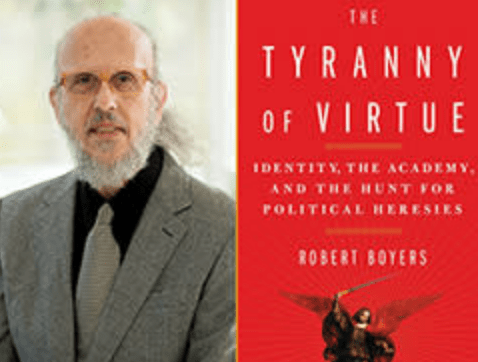Robert Boyers – Skidmore College academic and veteran professor – wrote The Tyranny of Virtue to collect his thoughts on social justice movements among college students. I can imagine many of you rolling your eyes. Your worry is clear enough. Is Boyers just an old white man who can’t change with the times, comfortable at his privileged liberal arts college and reluctant to embrace the change that’s reached even his ivory tower?
Maybe.
White Man at Skidmore
If you look for that reading of Boyers, you’ll find plenty of material. The Tyranny of Virtue – as a title – certainly suggests as much. But when you look into it more closely, I think you’ll find something different bothers Boyers. Less that he lives in a non-white world and more that he lives in an elite, wealthy bubble called Skidmore College.
Boyers raises some good points. He tells credible stories about students using terms they don’t yet understand, e.g., ‘microaggression,’ to avoid facing up to their own challenges. And he contrasts these stories to his own New York working class experience at CUNY.
A professor once called Boyers out on his working class accent. He advised Boyers to take speech lessons in order to be taken seriously in academia. Boyers cites it not as evidence of a microaggression – which many people, myself included, would likely call it – but rather as a piece of good advice for a tough world. By contrast, Boyers sees many of the concerns of his own students as the overwrought worries of rich kids.
Ultimately, Boyers’s point here is that terms like ‘microaggression’ or ‘privilege’ don’t pick out unitary concepts. He acknowledges these things exist. But he thinks they operate in more complicated ways than his students allow. He argues we shouldn’t use social justice concepts as weapons with which to attack others. Rather, he thinks he sees them as tools to use in exploring the world.
The Privileged and the Poor
In short, I think the basic thesis here is that the tyranny of virtue is one wealthy students wage against poorer people. It’s not about young versus old or hip versus square, which tend to be the angles right-wing commentators take on these issues.
Nevertheless, Boyers comes down a bit hard on his students. Do some of his students take things too far? Surely. It’s not hard to chronicle some of those cases, and I’ve done it before. However, it’s important to give students the time and space to work through these issues. From there, we can support them in their efforts to overcome their own wealthier backgrounds in non-identitarian ways.
Maybe Boyers is right to show tough love in some cases, but I doubt this extends very far. It’s much easier to maintain one’s ‘enlightened liberalism’ via tough love. It’s more difficult to build the right bridges.
The Tyranny of Virtue
Boyers claims academia is currently moving toward a ‘total cultural environment’ where dissent from a kind of neoliberal, identity-based consensus is no longer tolerated. As the enlightened liberal, he of course counters with the principles of a Mill or a Tocqueville.
He gives plenty of examples – from a crackdown against tepid criticism of the hiring of a Chief Diversity Officer at Skidmore to innocent slips in language being labeled as ‘microaggression’ to rehash of the (in)famous Laura Kipnis case at Northwestern.
In the end, much of this material is pretty slippery. Some of these cases raise troubles for identity movements and others don’t. Insofar as they do raise troubles, those troubles tend to concentrate around elite institutions. Many of these issues look wildly unfamiliar to people teaching or learning at lower ranked, public schools. These latter schools, of course, compose the vast majority of the U.S. higher education system.
Where Boyers’s argument lands more plausibly? He argues much of the language of privilege is ‘junk thought’ – sloppy thinking we’ve decided to grant a free pass. He thinks people reify identity to the point they gloss over or ignore deeper causal forces in the world.
There’s some truth to that.
The Language of ‘Privilege’ is Often the Language of the Privileged
‘The tyranny of virtue’ – as a theme – veers dangerously close to right-wing thought. And most right-wing opinion on this theme is garbage. Thankfully, Boyers doesn’t descend too far down that rabbit hole.
A point worth keeping in mind – both for Boyers and the people he challenges? Marginalized youth don’t speak with a unitary voice. Listening to young people requires both taking their ideas seriously and recognizing that sometimes they speak with the glib overconfidence of youth.
At his best, Boyers respects this balance. At his worst, he doesn’t. He shouldn’t generalize from wealthy Skidmore students to college kids in general. The marginalized youth of Skidmore face situations unique to the wealthy, but still marginalized. They face real microaggressions. And they also wield powerful tools for fighting those microaggressions. At times, their complaints sound not like ones from facing hardships, but rather from wanting access to the privileges they believe their wealth entitles them to. And so, one must both take them seriously and with a grain of salt.
It’s difficult to strike that balance.
